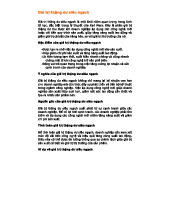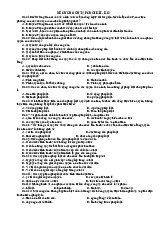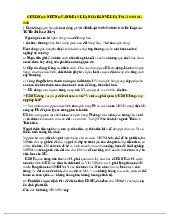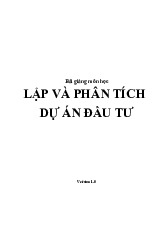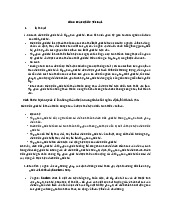













Preview text:
lOMoARcPSD| 38777299
NATIONAL ECONOMICS UNIVERSITY
SCHOOL OF ADVANCED EDUCATION PROGRAMS -------***------- BUSINESS LAW
AN ANALYSIS OF CASE STUDY
Pope v. Triangle Chemical Co., 277 S.E.2d 758 (Ga.1981) Page 437 & VIETNAMESE CASE STUDY Table of Contents
PART 1. Case Introduction: Facts, Issues & Rules ....................................................... 2
1. Facts: ....................................................................................................................... 2
2. Definition: ............................................................................................................... 2
3. Issues: ...................................................................................................................... 4
4. Rules related: .......................................................................................................... 4
PART 2. Judicial Decision & Analysis .......................................................................... 6
PART 3. Conclusion & Summary Map ......................................................................... 8
PART 4 . Application in Vietnam .................................................................................. 8
1. Parties involved ....................................................................................................... 8
2. Facts ........................................................................................................................ 9
3. The decision trial court ......................................................................................... 10
4. Appeal: .................................................................................................................. 11
5. Opinion + Decision of appellate court .................................................................. 11
References: ................................................................................................................... 14 lOMoARcPSD| 38777299
PART 1. Case Introduction: Facts, Issues & Rules 1. Facts:
Triangle Chemical Company supplied $671.10 worth of fertilizer and chemicals to
France Mathis to produce a cabbage crop. When Mr. Mathis first asked for credit, he
was denied. He then told Triangle that he had a new partner, Emory Pope. The company
president called Mr. Pope, who said that he was backing Mr. Mathis.
Mr. Nash, District Manager for Triangle, testified that Mathis told him "he and Pope
were working together on this crop and that Mr. Pope would be responsible for the
bills."Because Mr. Pope was to be paying the bills on the cabbage crop, at that point in
time we decided to extend some credit based on the fact that both of them would be
involved." Nash spoke to Pope who told him he and Mathis "were growing this cabbage
crop together and he was acting as more or less handling the money and France, Mr.
Mathis, was growing the crop...[Pope] told me in the conversation that he was
responsible for the bill." Prior to this conversation, two purchases had been made by
Mathis amounting to $671.10. Nothing was placed in writing to verify Pope's purported
agreement to be responsible for items purchased by Mathis.
Pope testified that he had conversations with Clark and Nash, but denied he told them
he authorized purchases to be charged to his name or that a partnership existed between
him and Mathis. He stated that he told them only that he and Mr. Mills "were supplying
Mathis with the money and it was up to Mathis to settle the account." Mr. Pope argued
that his promise to pay the debt would have to be in writing to be enforceable under
Georgia's statute of frauds. Triangle Chemical Co. claimed that Mr. Pope was a partner
in the farming venture with Mathis and was therefore personally liable for the debt.
The jury was instructed on the formation of a contract, an agreement to pay for the debt
of another, and the creation of a partnership both between the partners, and as to third persons. 2. Definition: a) Formation of Partnerships
A partnership can be formed voluntarily by direct action of the parties, such as through
a partnership agreement or articles of partnership, or its formation can be implied by
conduct. However, conduct also creates partnerships.
In certain circumstances, courts find that a partnership exists because of the conduct of
the parties, a partnership by implication. A partnership by implication arises because lOMoAR cPSD| 38777299
certain behaviors of the principals lead third parties to believe there is a partnership.
Courts examine a number of factors to determine whether a partnership by implication
has been created. Section 7 of the RUPA provides that if two or more parties share the
profits of a business, it is prima facie evidence that a partnership exists. (Prima facie
evidence means that there is a presumption that a partnership exists.) However, the
presumption of partnership by profit sharing can be overcome if someone received
profits for any of the following reasons:
1. Profits paid to repay debts
2. Profits paid as wages or rent
3. Profits paid to a widow or an estate representative4. Profits paid for the sale of business goodwill b) Partner Liability
Each partner is both a principal and an agent to the other partners and is liable for the
acts of others and to the others for individual acts. If one partner enters into a contract
for partnership business supplies, all the partners are liable. Similarly, if one partner has
a motor vehicle accident while on a partnership delivery, the individual partner is liable
for his or her own negligence, but because the accident occurred under the scope of a
partnership business, the partners and the partnership are also liable. Under the RUPA,
partners are jointly and severally liable for all obligations
If partnership assets are exhausted, each partner is individually liable. Creditors can
satisfy their claims by looking to the assets of the individual partners after the
partnership assets are exhausted. Each partner in a partnership is both a principal and
an agent to the other partners and is liable for the acts of others and to the others for
individual acts. This includes being liable for the partnership's debts.
The decision in Pope v. Triangle Chemical Co. was that Emory Pope was personally
liable for the debt owed by France Mathis to Triangle Chemical Company. The court
found that Pope was, in fact, a partner with Mathis and therefore jointly and severally
liable for the partnership's debts, specifically the debt owed to Triangle Chemical Company. lOMoARcPSD| 38777299 3. Issues:
a. Did Mr. Pope and Mr. Marthis have formed any partnership?
Yes, a Partnership by estoppel, also known as "ostensible partnerships," arose in this
case. This is when a person holds themselves out to the public as a partner in a business,
even if they are not actually a partner. Under the law, if a person presents themselves as
a partner and another person relies on that representation to their detriment, the person
holding themselves out as a partner can be held liable as if they were actually a partner in the business
b. Was Mr. Pope liable for the debt that Mr. Marthis owed to Triangle Co.?
Yes, Each partner is both a principal and an agent to the other partners and is liable for
the acts of others and to the others for individual acts. Under the RUPA, partners are
jointly and severally liable for all obligations. If partnership assets are exhausted, each
partner is individually liable. Creditors can satisfy their claims by looking at the assets
of the individual partners after the partnership assets are exhausted. 4. Rules related: 2021 Georgia Code
Title 14 - Corporations, Partnerships, and Associations Chapter 8 - Partnerships
§ 14-8-7. Determination of Existence of Partnership
In determining whether a partnership exists, the following rules shall apply:
1. Except as provided by Code Section 14-8-16 persons who are not partners as to
each other are not partners as to third persons;
2. Joint tenancy, tenancy in common, tenancy by the entireties, joint property,
common property, or part ownership does not of itself establish a partnership,
whether such co-owners do or do not share any profits made by the use of the property;
3. The sharing of gross returns does not of itself establish a partnership, whether or
not the persons sharing them have a joint or common right or interest in any
property from which the returns are derived;
4. The receipt by a person of a share of the profits of a business is prima-facie
evidence that he is a partner in the business; provided, however, that no such
inference shall be drawn if profits were received in payment of the following,
even though the amount of payment varies with the profits of the business:
A. A debt, whether by installments or otherwise; lOMoAR cPSD| 38777299
B. Wages, salary, or other compensation to an employee or independent contractor; C. Rent to a landlord;
D. An annuity or other payment to a surviving spouse or representative of a deceased partner;
E. Interest or other payment or charge on a loan;
F. Consideration for the sale of good will of a business or other property,
whether by installments or otherwise. lOMoARcPSD| 38777299
PART 2. Judicial Decision & Analysis - Partnership
Based on opinion from court of appeals, unfortunately, we cannot identify whether any
certain partnership exists between Pope and Mathis, but here is the opinion from the appellate court:
(a) A partnership may be established either by a writing or by parol (Code Ann. § 75101
(Code § 75-101)), or as to third persons such as Triangle and BVC, a joint interest in
profits and losses of the business, but a common interest in profits alone would not.
Code Ann. § 75-102 (Code § 75-102). The defendant stated that his interest was limited
to "backing" Mathis, with a 10% interest in the profits.
Basically, the partnership would be recognized to third parties, such as Triangle and
BVC, if there was a joint interest in both profits and losses of the business. However, if
there was only a common interest in profits and not losses, then it would not be considered a partnership.
The defendant claims that his role in the partnership was limited to providing financial
backing for Mathis and that he had a 10% interest in the profits of the business. It is not
clear from this statement whether the defendant had a joint interest in both profits and
losses or only a common interest in profits. - Liability
An actual contract by which a partnership is formed is not always essential to support
the liability of one person as the partner of another. "As to third persons, he may assume
such a liability by inducing them to extend a credit upon the faith of his representations
*388 made by him, either express or implied, to the effect that he was a partner and as
such liable." Carlton v. Grissom & Co., 98 Ga. 118, 121 (2) (26 SE 77). "Whatever may
be the interest of the parties, and whether they be, in fact, partners under the bargain or
not, they will be liable, as such, if they so act as to hold themselves out to the world as
such." Sankey & Shorter v. Columbus Iron Works, 44 Ga. 228 (2). Thus, "[c]redit
extended to a firm on the faith of representations by a person that he is interested in the
same, will create a debt against him as a partner." Carmichael v. Greer, Lake & Co., 55
Ga. 116 (3); accord, Southern Cotton Oil Co. v. Brownlee, 26 Ga. App. 782 (1) (107 SE 355). lOMoAR cPSD| 38777299
This statement suggests that individuals can be held liable as partners, regardless of
whether they have formally entered into a partnership agreement or not. If these
individuals act in a way that gives the impression to the public or to third parties that
they are partners, they can be held responsible as if they were in a partnership.
Now let’s considering the Statute of Frauds
Defendant's reliance upon the Statute of Frauds is not well founded. The Statute does
provide that a promise to answer for the debt of another must be in writing to be
enforceable. Code Ann. § 20-401 (2), supra. However, the promise required by this
section to be in writing does not include an original undertaking. Moate v. H. L. Green
Co., 95 Ga. App. 493, 504 (98 SE2d 185); see also Cordray v. James, 19 Ga. App. 156
(1) (91 SE 239); Maddox v. Pierce, 74 Ga. 838; Crowder v. Keys, 91 Ga. 180, 181 (16
SE 986); Easterling v. Bell, 29 Ga. App. 465 (1) (116 SE 50). Thus, where the promiser
"guarantees" another's debt with additional qualifying words such as he would see that
the creditor gets paid, and that he is responsible for the bill, and credit is extended in
reliance upon such words, the jury would be authorized to find that this was an original
undertaking. Chastain-Roberts Co. v. Better Brands, 141 Ga. App. 186, 190 (233 SE2d 5).
The statement is saying that the defendant's reliance on the Statute of Frauds is not
justified because the law does not require a promise to be in writing if it is an original
undertaking. An original undertaking is a promise to pay the debt directly, rather than
just guaranteeing that someone else will pay it.
If the promiser uses qualifying words, such as "I will pay the debt" or "I am responsible
for the bill," and credit is extended based on those words, then it could be considered
an original undertaking and not subject to the Statute of Frauds. - Conclusion
"Partnership or no partnership is generally a mixed question of law and fact, and can
not be resolved as a matter of law unless the verdict one way or the other is demanded
by the evidence." Miraglia *389 v. Gose, 17 Ga. App. 639 (2) (87 SE 906). Whether a
person has held himself out as a partner, and whether a third person has relied upon
such acts, is a question of fact for the jury. Chambliss v. Hall, 113 Ga. App. 96, 99 (2) (147 SE2d 334).
The fact that Nash testified that Pope did not disaffirm the *390 previous items of credit
does not change the result for this places those two previous items within the Statute of
Frauds as previously discussed. Accordingly, the judgment for Triangle will be affirmed lOMoARcPSD| 38777299
on condition that the pre-existing debt in the amount of $671.10 be written off, otherwise it is reversed.
PART 3. Conclusion & Summary Map
Plaintiffs alleged that they supplied fertilizer, chemicals, and other items to Pope and
Mathis to produce a cabbage crop. Plaintiffs contended that Pope and Mathis were
partners and that Pope personally guaranteed the payment of the debt on the open
account. Pope denied that he was a partner with Mathis and his sole participation was
to provide the money to Mathis for the purpose of growing the crop. He asserted the
defense of the Statute of Frauds, e.g., that a promise to answer for the debt of another
must be in writing. See Code Ann. § 20-401 (2) (Code § 20-401 as amended Ga. L. 1962, pp. 156, 427)
PART 4 . Application in Vietnam 1. Parties involved
- Plaintiff: Asia Commercial Joint Stock Bank (ACB)
- Defendant: T.H.T One Member Limited Liability Company, legal representative:
Mr.Nguyen Tien T - Position: Chairman and Mrs. Nguyen Thi Th - Position: Director
- Parties with related rights and obligations: Mr. Nguyen Tien T and Mrs. Nguyen Thi Th lOMoARcPSD| 38777299 2. Facts -
On October 15th, 2019, ACB granted a loan to T.H.T One Member Limited
Liability Company with a total amount of 6,807,000,000 VND, with overdue interest
rates of 150% of the in-term interest rate and late payment penalty interest rates of 10% per year. -
The in-term interest rates and loan term were stipulated in 7 debt
acknowledgmentagreements as follows:
1. Debt acknowledgment agreement No. 289645729 dated August 9th, 2019;
disbursed amount: 1,900,000,000 VND; loan term: 6 months from August 10th,
2019 to February 9th, 2020; in-term interest rate: 9.00% per year, fixed for the
first 3 months, and adjusted every 3 months thereafter.
2. Debt acknowledgment agreement No. 294256939 dated October 16th, 2019;
disbursed amount: 300,000,000 VND.
3. Debt acknowledgment agreement No. 294358169 dated October 18th, 2019;
disbursed amount: 1,100,000,000 VND.
4. Debt acknowledgment agreement No. 294917949 dated October 26th, 2019;
disbursed amount: 2,000,000,000 VND.
5. Debt acknowledgment agreement No. 295343579 dated November 1st, 2019;
disbursed amount: 1,500,000,000 VND.
6. Debt acknowledgment agreement No. 296729319 dated November 22nd, 2019;
disbursed amount: 740,000,000 VND.
7. Debt acknowledgment agreement No. 296955629 dated November 26th, 2019;
disbursed amount: 750,000,000 VND. -
Mr. Nguyen Tien T and Mrs. Nguyen Thi Th pledged 04 land use rights and
properties attached to the land belonging to their ownership and use, including:
● Certificate of Land Use Right and Property attached to the Land at land parcel
number 41, map sheet number 76, granted by the People's Committee of DH
district on September 8, 2015 to Mrs. Nguyen Thi Th;
● Certificate of Land Use Right and Property attached to the Land at land parcel
number 08, map sheet number 81, granted by the People's Committee of DH
district on September 8, 2015 to Mrs. Nguyen Thi Th;
● Certificate of Land Use Right and Property attached to the Land at land parcel
number 57, map sheet number 76, granted by the Department of Natural
Resources and Environment of Kon Tum province on February 23, 2017 to Mrs. Nguyen Thi Th.
● Certificate of Land Use Right and Property attached to the Land at land parcel
number 147, map sheet number 53, granted by the Department of Natural lOMoARcPSD| 38777299
Resources and Environment of Kon Tum province on September 17, 2018 to Mr.
Nguyen Tien T and Mrs. Nguyen Thi Th. -
On March 19, 2019, Mr. Nguyen Tien T and Mrs. Nguyen Thi Th signed a
contract committing to jointly repay the debt to the bank with the company. The bank
demanded that the debtor repay the amount of 7,451,036,983 VNĐ (as of August 26,
2021), including the principal debt of 6,807,000,000 VNĐ ( and the additional interest
rate), in-term interest of 144,512,335 Vietnamese dong, overdue interest of
491,925,105 VNĐ, late payment penalty of 7,599,543 VNĐ, and continue to pay
interest and late payment penalties accruing from August 27, 2021, until the entire debt is paid off.
If the debtor fails to fulfill or fails to fulfill the obligation to repay the debt correctly,
ACB is entitled to request the court to handle the collateral assets. If the collateral assets
are not sufficient to pay off the debt, Mr. T and Mrs. Th will be jointly responsible with
the company for continuing to repay the debt. -
The debtor acknowledges the loan debt, the amount of the principal debt,
interest,and late payment penalties, and agrees to sell the collateral assets if they cannot
repay the debt. However, Mrs. Th does not agree with the bank's request that Mr.
Nguyen Tien T and Mrs. Nguyen Thi Th jointly fulfill the obligation to repay the debt
according to the commitment letter dated March 19, 2019.
3. The decision trial court -
Based on the laws: Article 30.1; Article 35.1.a; Article 39.1.a; Article 273 of
the2015 Civil Procedure Code; Based on Articles 280, 299, 317, 323, 335, 336, 338,
339, 342, 357, 463, 466, 468, 470 of the 2015 Civil Code; Based on Articles 91, 95 of
the 2010 Law on Credit Institutions -
Accepting the plaintiff's lawsuit request from Asia Commercial Joint Stock Bank (ACB).
● The Limited Liability Company Ltd T.H.T is obligated to repay the debt to ACB
in the total amount of 7,451,036,983 VNĐ (including interest rate and penalties),
including principal debt of 6,807,000,000 VNĐ, on-time interest of 144,512,335
VNĐ, overdue interest of 491,925,105 VNĐ, and late payment penalty of 7,599,543 VNĐ.
● From the effective date of the judgment, if ACB files an enforcement request,
Ltd T.H.T must continue to bear the interest amount of the remaining debt
according to the interest rate agreed upon by the four parties in the credit
agreement from the day following the day of the first-instance trial (August 26,
2021) until the debt is fully paid. lOMoARcPSD| 38777299
● From the effective date of the judgment, if Ltd T.H.T fails to fully pay the
amount to ACB, ACB has the right to request the competent civil enforcement
agency to handle the collateral assets.
● In case the amount of processed collateral assets is not enough to pay off Ltd
T.H.T's debt, Mr. Nguyen Tien T and Mrs. Nguyen Thi Th are jointly
responsible with Ltd T.H.T to fulfill the debt repayment obligation according to
the commitment letter dated March 19, 2019. 4. Appeal: -
On September 17, 2021, the person with rights and obligations involved, Ms.
Nguyen Thi Th, appealed the entire first-instance verdict, requesting that the
firstinstance verdict on asset handling within the scope of assurance be amended, and
the first-instance court held Mr. Nguyen Tien T and Ms. Nguyen Thi Th jointly
responsible with T.H.T Ltd Co., Ltd. to fulfill the debt repayment obligation according
to the commitment letter dated March 19, 2019, which was not in accordance with the
provisions of the law, and requested that the appeal be accepted. -
The representative of the People's Procuracy of Kon Tum province expressed
their views on the settlement of the case: The above debt was borrowed by the Company
from a bank, and Mr. Nguyen Tien T and Ms. Nguyen Thi Th used their own assets to
secure the loan for the Company and were only responsible for the secured assets. The
first-instance court held Mr. Nguyen Tien T and Ms. Nguyen Thi Th jointly responsible
with T.H.T Ltd Co., Ltd. to fulfill the debt repayment obligation according to the
commitment letter dated March 19, 2019, which was contrary to the provisions of the
law. Therefore, it is requested that the Court of Appeal accept the appeal and amend
the first-instance verdict based on Article 308(2) and Article 309 of the Civil Procedure Code.
5. Opinion + Decision of appellate court - Consider the appeal:
● At the appellate court hearing, the authorized representative of Ms. Th requested
a change in the appeal content. Reason: The court of first instance accepted the
lawsuit request for the principal amount, interest within the limit, overdue
interest, late payment penalty interest, and collateral (guarantee) assets in accordance with the law.
● Appeal consideration: Not agreeing with the judgment of the court of first
instance that obligates Mr. Nguyen Tien T and Mrs. Nguyen Thi Th to jointly lOMoAR cPSD| 38777299
fulfill the debt repayment obligation according to the commitment paper dated
March 19, 2019, of the plaintiff, ACB Bank, the trial panel found that:
○ On March 19, 2019, Mr. Nguyen Tien T and Mrs. Nguyen Thi Th signed
the commitment paper on debt repayment (BL63a), content..."The party
commits to jointly repay the debt with the credit-granted party according
to the loan contract term and other contents of the credit contract, the
annexes of the contract, the debt-receiving agreement, and other
commitments of the credit-granted party. ACB has the right to demand
one of the two parties (commitment party and credit-granted party) or
both parties to fulfill the debt repayment obligation"...
○ The content does not reflect the joint responsibility of Mr. T and Mrs. Th
with the Ltd T.H.T Limited Company to fulfill the debt repayment obligation.
○ Moreover, this commitment paper was signed by Mr. T and Mrs. Th as
individuals, not as a company or as three parties, and is not in accordance
with the provisions on the scope of secured obligations, handling secured
assets under Article 293, Article 295, Article 299 of the 2015 Civil Code,
Decree No. 163/2006/ND-CP of December 29, 2006, and Decree No.
11/2012 of the Government on secured transactions. Furthermore,
according to Article 74 of the Enterprise Law, the Ltd Limited Company,
the company's owner, is responsible for the company's debts and other
asset obligations within the scope of the company's charter capital.
○ The credit and mortgage contracts for land use rights signed between Mrs.
Nguyen Thi Th, Mr. T, and ACB also do not agree or specify that Mrs.
Nguyen Thi Th and Mr. T have joint liability if the collateral is not
sufficient to pay off the company's debt.
○ At the appellate court hearing, the plaintiff could not provide evidence to
prove their request that Mrs. Nguyen Thi Th and Mr. T have joint liability
if the collateral is not sufficient to pay off the company's debt.
○ Based on the above reasons, the appeal of the person with related rights
and obligations, Mrs. Nguyen Thi Th, should be accepted, and the
judgment of the court of first instance should be amended accordingly.
- Decision of appellate court: partly disaffirm trial court’s decision -> reverse
● Based on: Article 30 Section 1; Point b Article 35 Section 1; Point a Article 39
Section 1; Section 2 Article 308, Article 309 of the 2015 Civil Procedure Code:
-> Accept the appeal of the person with rights and obligations related to Ms.
Nguyen Thi Th. Amend a part of the commercial business judgment of the
District People's Court of DH, Kon Tum province.
● Based on: Articles 280, 293, 295, 299, 317, 323, 335, 357, 463, 466, 468, 470 of
the 2015 Civil Code; Articles 91, 95 of the 2010 Law on Credit Institutions. -> lOMoAR cPSD| 38777299
Oblige T.H.T Limited Liability Company to pay a total amount of 7,451,036,983
VND (Seven billion four hundred fifty-one million thirty-six thousand nine
hundred eighty-three Vietnamese Dong) to Asia Commercial Joint Stock Bank
(ACB) (including principal debt of 6,807,000,000 VND, interm interest of
144,512,335 VND, overdue interest of 491,925,105 VND, and late payment
interest of 7,599,543 VND) with interest calculated up to August 26, 2021. - Law applied:
Article 74 Enterprise Law: “Single-member limited liability company is an enterprise
owned by an organization or individual (hereinafter referred to as the company owner).
The company owner is responsible for the company's debts and other property
obligations to the extent of the company's charter capital.”
-> One Member Limited Liability Company, the owner of the Company is responsible
for the debts and other property obligations of the company to the extent no. charter capital of the company Decree No. 163/2006/ND-CP
Section 5, Article 3: A secured obligation is a part or the whole of a civil obligation,
which may be a present obligation, a future obligation or a conditional obligation for
which the performance of such obligation is guaranteed. secured by one or more secured transactions. Lesson learned
1. Get it in writing: The case highlights the importance of having written
agreements when it comes to promises to pay debts owed by another person or
entity. The court found that Mr. Pope's promise to pay Mr. Mathis's debt would
have had to be in writing in order to be enforceable under the statute of frauds.
2. Verify information: When extending credit, it is important to verify
informationprovided by potential customers. In this case, Triangle Chemical
initially denied credit to Mr. Mathis but later extended credit when he said he
had a new partner who would pay the bills. It is unclear whether Triangle
Chemical verified this information before extending credit.
3. Determining whether a Partnership exists: The case demonstrates the
importance of understanding the legal relationships between individuals and
businesses. In this case, the court found that it is difficult to determine whether
a partnership exists between Mr. Pope and Mr. Mathis. It is relative to any
specific case and this decision is reversed by the court.
4. The limitations of legal liability: Finally, the case illustrates the limitations of
legal liability, as the court found that Mr. Pope was not personally liable for the
debt owed to Triangle Chemical. This highlights the importance of
understanding the scope of legal liability in a given situation and the factors
that may limit or expand that liability. lOMoARcPSD| 38777299 References:
1. https://law.justia.com/cases/georgia/court-of-appeals/1981/61246.html 2.
https://congbobanan.toaan.gov.vn/3ta892755t1cvn/?
fbclid=IwAR3rotx2sImHwb9dX1gYnMMmCOQHFlCMFJ_G28vNpQ MXfJpXH5ZuwMh3LfE
3. https://hethongphapluat.com/luat-doanh-nghiep-2020/dieu-74
4. https://law.justia.com/codes/georgia/2021/title-14/chapter-8/section-14- 8-7/
